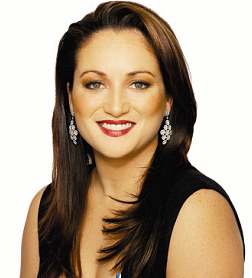 Amelia
Farrugia – Driving Talent
Amelia
Farrugia – Driving Talent
By Randolph Magri-Overend
I meet Amelia Farrugia
in a café within spitting distance
of Sydney’s Opera Centre. There’s nothing
conspiratorial here. Elizabeth Street,
in the centre of Sydney, on a hot and
humid afternoon with all doors and windows
open is as exposed as you can get. Not
like Celia Johnson’s brief encounters
with Trevor Howard drinking Lyon’s Corner
Shop chicory. I’ve been face to face
with Amelia before when interviewing
her for the Opera Australia programme
on community radio station 2MBS. She
hasn’t changed. Still down to earth,
almost brash and full of confidence
with high energy levels. If she were
inanimate she’d be described as a bouncing
ball. But she’s flesh and blood, devouring
a ricotta-filled pastry ensemble with
a frothy cappuccino on the side. We
have half an hour before she rehearses
with Richard Bonynge.
She is about to launch
her debut album Joie de Vivre! [tbr]
a collection of arias and songs that
show off her young but exciting coloratura
voice. It’s a big gamble on her part.
She’s financed it with her own money,
her husband’s, her father’s and a sponsorship
from Australia’s Commonwealth Bank.
Decca’s come to the party too and are
distributing and marketing it. In fact
they arranged for Amelia to sing for
none other than Luciano Pavarotti the
night before. That too was a brief encounter
and he advised her on ‘how to pace the
sound and how to improve the phrasing’.
She radiates excitement as she recalls
the experience.
She is determination
and drive personified, one thing that
impressed me at our previous meeting.
Is that the case, I ask. She doesn’t
disagree. She freely admits to wanting
to be on stage ever since she can remember.
At primary school she was nicknamed
Poser because she was forever
standing up in class and singing. But
ballet took priority until at 13 she
decided to pursue singing because ‘I
started blossoming into a womanly figure
and my toes were starting to bleed’.
At 16 she enrolled at the Sydney Conservatorium,
graduating 4 years later with a Bachelor
of Music Education degree. She was advised
not to pursue a singing career. But
she did, singing in The Buddy Holly
Story and covering Christine in
Phantom of the Opera. In 1994
she made her OA debut as Casilda in
The Gondoliers. This year she
sang The Queen of the Night, Zwanntie
in Richard Mills’ Batavia and
Adina in L’elisir d’amore for
Opera Australia
Ten years ago she married
Paul Chesher who promotes open-air concerts
and they have a 4½ year old son, Ben.
A few months before the nuptials she
was involved in a real-life drama of
her own when she found herself in The
Blue Arrow Café at Port Arthur,
Tasmania. Port Arthur is a derelict
convict settlement developed into a
tourist attraction. On that day, 28
April 1996, a deluded Martin Bryant
armed with a high-powered rifle scoured
the landscape looking for victims. Farrugia
and a group of friends took refuge in
a derelict building until the all-clear
was sounded. There were 35 fatalities
that day, most of them in the café.
Bryant was captured alive and now lives
in the psychiatric ward of a maximum-security
prison.
She has a fascination
for the role of Massenet’s Manon.
I refer to Manon’s character as scally-waggish.
She doesn’t disagree again. She relates
to her. Why? She’s not sure but ‘she
has quite an impetuous nature, makes
quick decisions, goes to what attracts
her without first thinking, doesn’t
let anything stand in her way yet deep
down she is a very good person and in
the end she’s remorseful and asks for
forgiveness.’ I mention the similarities
between Manon and Lady Hamilton. Amazingly
Amelia’s never heard of Emma Hamilton.
I compare the similarities.
It’s taken ten years
to bring the CD to fruition. The last
three years have been a constant grind
arranging orchestras (BBC Symphony,
no less), recording hall (Maida Vale),
and conductor Alexander Briger (a true-blooded
Aussie) not to mention insurance, sponsorships,
recording staff, publicity and the special
dresses for the CD blurb (haute Oz couture
- Alex Perry and Collette Dinnigan).
The prospect of recording another CD
is something to look forward to. As
is performing Gilda in Rigoletto
and Violetta in La Traviata for
the first time.
We exit the café
and run into Yvonne Kenny. They embrace
and I’m introduced. It’s not often you
find yourself flanked by two icons of
the operatic world. You won’t find me
complaining too loudly!
Randolph Magri-Overend
* Note:
Peter Sculthorpe composed
a very moving elegy on the subject of
the Blue Arrow Café atrocity.
RM-O

